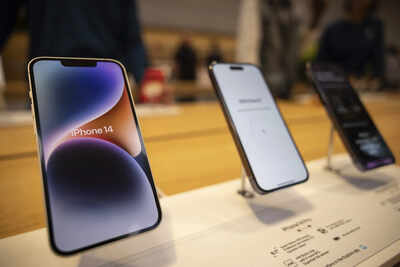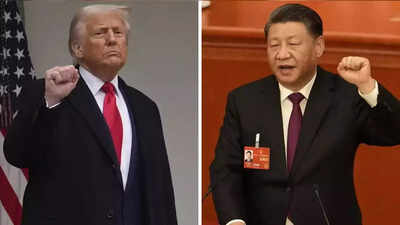Trump tariff effect: India’s electronic exports to be 20% cheaper than China in US, says ICEA

Indian exports of smartphones, laptops and other electronics to the US are expected to become 20% cheaper as compared to those from China, after the Trump administration removed tariffs on a range of consumer electronics, industry body ICEA said on Sunday
The move, announced over the weekend, is seen as a major boost for India’s rapidly growing electronics manufacturing sector. The US decided to exempt smartphones, tablets, laptops, flat-panel monitors and certain semiconductor components from the reciprocal tariffs imposed earlier on countries like China, India, and Vietnam.
The exemption implies that India and Vietnam now enjoy a major tariff advantage over China in exporting these products to the US.
“China still has 20 per cent of iPhones, laptops, tablets, and watches. Only reciprocal tariff has been removed for China. India has zero tariff on iPhones and all smartphones, laptops and tablets exported to the US. Vietnam also has zero tariff on all Samsung and other smartphones, laptops and tablets exported to the US. So India and Vietnam are similarly placed on tariffs on these products and both enjoy a 20 per cent tariff advantage over China,” said Pankaj Mohindroo, chairman of the India cellular and electronics association (ICEA).
ICEA, which represents major companies such as Apple, Foxconn, and Dixon, noted that the exemption brought the much needed relief after weeks of concern over potential disruption in exports. “Now there will be no extraordinary disruption,” Mohindroo said. “the incredible shock of the last few weeks is in itself a tectonic event and the realignments are bound to happen without too much blood spilt in our category.”
India has emerged as a key manufacturing hub for Apple, with iPhone exports alone reaching Rs 1.5 lakh crore in 2024-25, according to Union minister Ashwini Vaishnaw. Total mobile phone exports crossed Rs 2 lakh crore this year, a 55% jump from the previous fiscal.
Industry experts believe this latest development strengthens India’s position in the global electronics supply chain, especially as US-China trade tensions continue.
Ashok Chandak, president of the India electronics and semiconductor association (IESA), called the tariff exemption a significant, albeit possibly short-term reprieve for global tech manufacturers.
“Despite the dampening of near-term export euphoria, the long-term opportunity for India remains robust,” he said.
Chandak further added that with US imports of over $250 billion in electronics, of which 30 per cent still coming from China, India has significant room to grow from its current $12 billion base.
He said, “for Indian businesses, this is a vital window to scale up operations, reorient strategies, and strengthen their position in global electronics value chains. To fully realise this potential, India must double down on building long-term, sustainable competitive advantages.”
Faisal Kawoosa, chief analyst and co-founder of Techarc, said the exemption means “business as usual for brands like Apple in India, which will only grow further.” He added that the move will bring more predictability to global supply chains.
“Whether an olive branch or a pragmatic reset, the move helps reduce friction in a highly interconnected global electronics supply chain,” said Prabhu Ram, vice-president at CyberMedia Research.
Counterpoint Research’s Neil Shah added, “Bringing back the manufacturing of smartphones, especially iPhones, is going to be a marathon not a sprint if the US government is serious about it. And, if really serious, it could mean now is not the time and will need a very different strategy and multi-year incentive scheme.”




